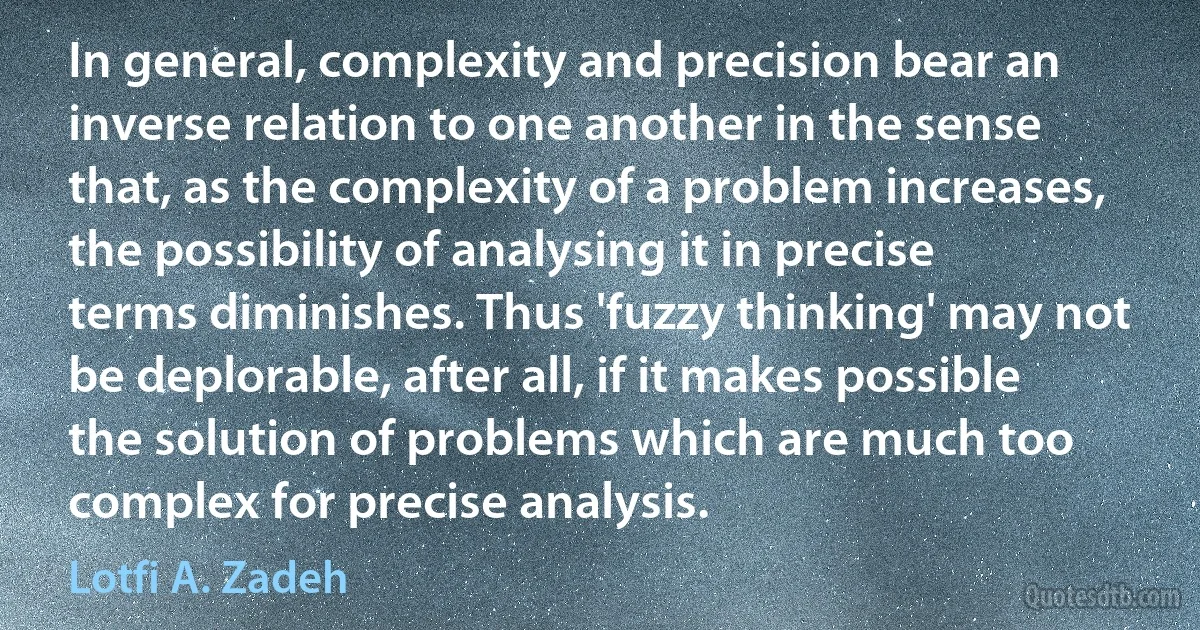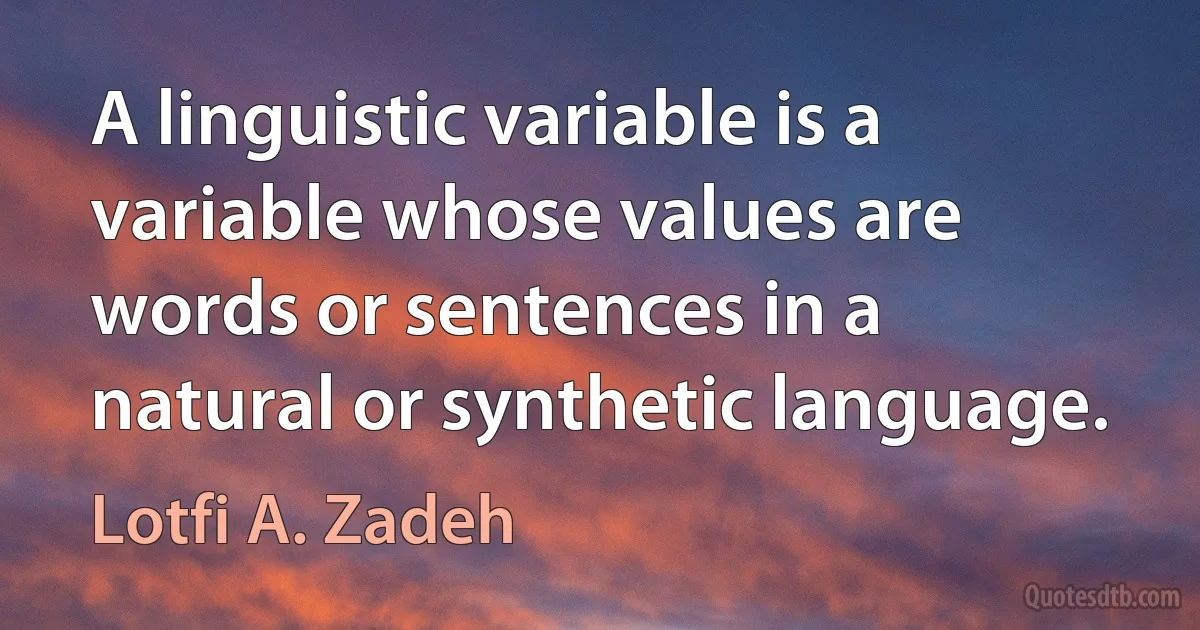Lotfi A. Zadeh quotes
Lotfi A. Zadeh was an engineer, computer scientist, and professor known for originating fuzzy logic. His groundbreaking work transformed fields such as artificial intelligence, control systems, and decision-making. He is widely recognized as one of the most influential thinkers in information and systems science. Here are 18 of his quotes:
The term fuzzy logic is used in this paper to describe an imprecise logical system, FL, in which the truth-values are fuzzy subsets of the unit interval with linguistic labels such as true, false, not true, very true, quite true, not very true and not very fake, etc.... As a consequence, the truth tables and the rules of inference in fuzzy logic are (i) inexact and (ii) dependent on the meaning associated with the primary truth-value true as well as the modifiers very quite.

Lotfi A. Zadeh
Essentially, a fuzzy algorithm is an ordered sequence of instructions (like a computer program) in which some of the instructions may contain labels or fuzzy sets, e.g.:
Reduce x slightly if y is very large
Increase x very slightly if y is not very large and not very small
If x is small then stop; otherwise increase x by 2.

Lotfi A. Zadeh
The advent of the Computer age has stimulated a rapid expansion in the use of quantitative techniques for the analysis of economic, urban, social, biological and other types of systems in which it is the animate rather than in dominant role. At present, most of the techniques employed for the analysis of humanistic, i.e., human centred systems are adaptations of the methods that have been developed over a long period of time for dealing with mechanistic systems, i.e., physical systems governed in the main by-the laws of mechanics, electromagnetism, and thermodynamics. The remarkable successes of these methods in unraveling the secrets of nature and enabling us to build better and better machines have inspired a widely held belief that the same or similar techniques can be applied with comparable effectiveness to the analysis of humanistic systems.

Lotfi A. Zadeh
[ Fuzzy logic is ] a logic whose distinguishing features are (i) fuzzy truth-values expressed in linguistic terms, e. g., true, very true, more or less true, or somewhat true, false, nor very true and not very false, etc2.; (2) imprecise truth tables; and (3) rules of inference whose validity is relative to a context rather than exact.

Lotfi A. Zadeh
In many, many fields. I expected people in the social sciences-economics, psychology, philosophy, linguistics, politics, sociology, religion and numerous other areas to pick up on it. It's been somewhat of a mystery to me why even to this day, so few social scientists have discovered how useful it could be. Instead, Fuzzy Logic was first embraced by engineers and used in industrial process controls and in "smart" consumer products such as hand-held camcorders that cancel out jittering and microwaves that cook your food perfectly at the touch of a single button. I didn't expect it to play out this way back in 1965.

Lotfi A. Zadeh
I can't say that anything has been "exciting". Rather, I would choose the word "interesting". Not too long ago, the Chinese University of Hong Kong conducted a survey to determine which consumer products were using Fuzzy Logic. The result was a thick report, some 150-200 pages long-washing machines, camcorders, microwave ovens, etc. What interested me wasn't the particular applications so much as the breadth of applications-so many products were incorporating Fuzzy Logic.

Lotfi A. Zadeh
"A frequent source of misunderstanding has to do with the interpretation of fuzzy logic. The problem is that the term fuzzy logic has two different meanings. More specifically, in a narrow sense, fuzzy logic, FLn, is a logical system which may be viewed as an extension and generalization of classical multivalued logics. But in a wider sense, fuzzy logic, FLw is almost synonymous with the theory of fuzzy sets. In this context, what is important to recognize is that: (a) FLw is much broader than FLn and subsumes FLn as one of its branches; (b) the agenda of FLn is very different from the agendas of classical multivalued logics; and (c) at this juncture, the term fuzzy logic is usually used in its wide rather than narrow sense, effectively equating fuzzy logic with FLw.

Lotfi A. Zadeh
Well, I knew it was going to be important. That much I knew. In fact, I had thought about sealing it in a dated envelope with my predictions and then opening it 20-30 years later to see if my intuitions were right. I realized this paper marked a new direction. I used to think about it this way-that one day Fuzzy Logic would turn out to be one of the most important things to come out of our Electrical Engineering Computer Systems Division at Berkeley. I never dreamed it would become a worldwide phenomenon. My expectations were much more modest.

Lotfi A. Zadeh
A fuzzy set is a class of objects with a continuum of grades of membership. Such a set is characterized by a membership (characteristic) function which assigns to each object a grade of membership ranging between zero and one. The notions of inclusion, union, intersection, complement, relation, convexity, etc., are extended to such sets, and various properties of these notions in the context of fuzzy sets are established. In particular, a separation theorem for convex fuzzy sets is proved without requiring that the fuzzy sets be disjoint.

Lotfi A. Zadeh
[T]he successes of modern control theory in the design of highly accurate space navigation systems have stimulated its use in the theoretical analyses of economic and biological systems. Similarly, the effectiveness of computer simulation techniques in the macroscopic analyses of physical systems has brought into vogue the use of computer-based econometric models for purposes of forecasting, economic planning, arid management.

Lotfi A. Zadeh
More often than not, the classes of objects encountered in the real physical world do not have precisely defined criteria of membership. For example, the class of animals clearly includes dogs, horses, birds, etc. as its members, and clearly excludes such objects as rocks, fluids, plants, etc. However, such objects as starfish, bacteria, etc. have an ambiguous status with respect to the class of animals. The same kind of ambiguity arises in the case of a number such as 10 in relation to the "class” of all real numbers which are much greater than 1.

Lotfi A. Zadeh
A frequent source of misunderstanding has to do with the interpretation of fuzzy logic. The problem is that the term fuzzy logic has two different meanings. More specifically, in a narrow sense, fuzzy logic, FLn, is a logical system which may be viewed as an extension and generalization of classical multivalued logics. But in a wider sense, fuzzy logic, FLw is almost synonymous with the theory of fuzzy sets.

Lotfi A. Zadeh
As an indispensable constituent of AI, fuzzy logic is a superset of conventional (Boolean) logic that has been extended to handle the concept of partial truth, where the truth value can range between completely true and completely false. As the creator of a new field of mathematics-fuzzy set theory and fuzzy logic-Lotfi Zadeh's intellectual contributions are myriad. He is also known for his research in system theory, information processing, AI, expert systems, natural language understanding, and the theory of evidence. His current research is focused on fuzzy logic, computing with words, and soft computing, which is a coalition of fuzzy logic, neurocomputing, evolutionary computing, probabilistic computing, and parts of machine learning.

Lotfi A. Zadeh
Lotfi A. Zadeh

Photo:
Eastdept,
CC BY-SA 4.0
Occupation: Engineer
Born: February 4, 1921
Died: September 6, 2017
Quotes count: 18
Wikipedia: Lotfi A. Zadeh


